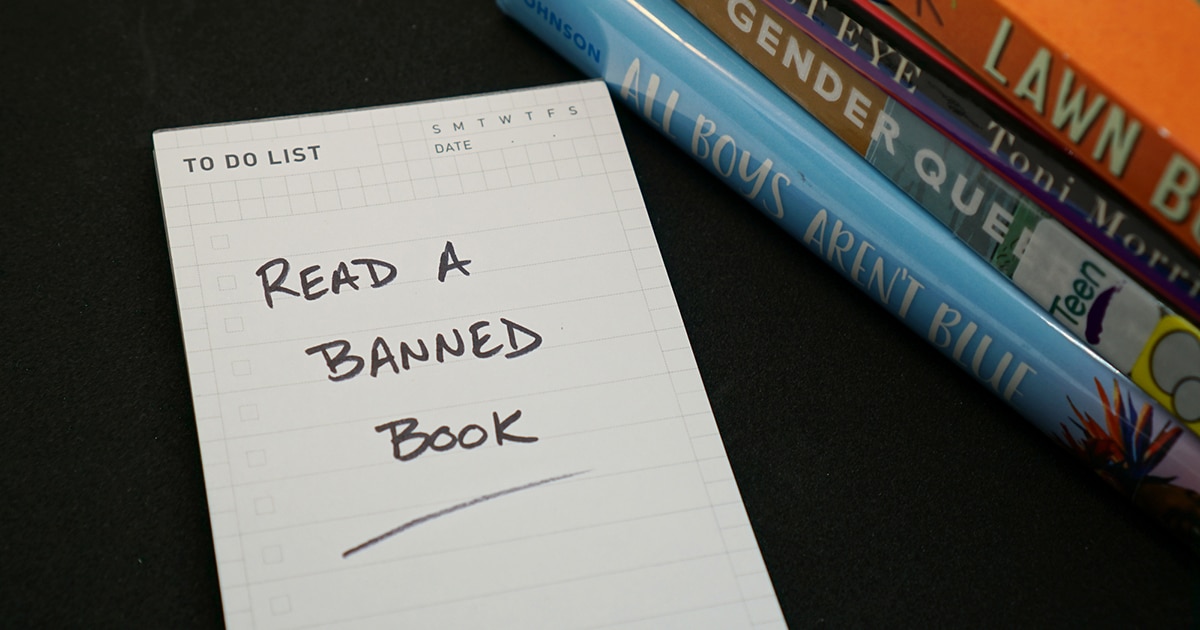Photo: MARIAR12/Depositphotos
This post may contain affiliate links. If you make a purchase, My Modern Met may earn an affiliate commission. Please read our disclosure for more information.
Book bans are at an all-time high in the United States. In 2021 the American Library Association (ALA) recorded 729 contested books — the highest number of attempted removals from shelves since the ALA began keeping track in 2000. These recent attacks have focused heavily on books dealing with gender, sexuality and race. In response to the ire of certain parents, state governments, and school boards, teens and adults have begun forming banned book clubs to resist censorship and provide forums to discuss important literature.
Though book banning has increased in recent years, fueled by a conservative culture war, it’s not new to America. The English Puritans banned books they considered heretical. James Joyces in the 1920s Ulysses was banned nationwide for “obscenity”. The ban was overturned in a famous court case in the Southern District of New York in 1933 turning point for freedom of speech and freedom of the press. mid-century history textbooks were also banned for being “un-American, subversive, and potentially communist.” In 1982, a landmark case even reached the Supreme Court. Five students challenged their New York high school’s decision to remove nine books from the library. The court ruled that the First Amendment protects the unique role of school libraries as stores of knowledge, stating, “Local school authorities may not remove books from school library shelves simply because they do not like the ideas contained in those books.”
The recent ban has raised eyebrows from many at the conspicuous group of targets. Recent bans and attempts focus on books that appeal Gender, LGBTQIA+ and racial identities in an age appropriate way. These include Gender Queer by Maia Kobabe (a comical treatise on non-binary identity), All boys are not blue by George M Johnson, The hate you give by AngieThomas. Others such as The colour purple, Killing a mockingbirdand Of mice and men have been at the top of the list of banned books for years. Recently banned from Mouse (a graphic novel about the Holocaust) in Tennessee caused an uproar when administrators called it disruptive. The general desire to erase uncomfortable subjects—no matter how critical they are to the story or the welfare of the students—is a driving force behind the bans.
Banned book clubs are forming to buck this trend and tackle uncomfortable issues head-on. Sensational bans have sparked interest in targeted works. That Banned Books Book Club was established as both a reading business and a library fund. Each month, readers will enjoy including a title together from a list Lover by Tony Morrison Beyond Magenta: Transgender Teens Speak Out by Susan Kuklin and The perks of Being a Wallflower by Stephen Chbosky. Other clubs plan to meet in person. The Banned Book Club at the Firefly Bookstore began with George Orwell’s animal farm, a book once banned in the Soviet Union and contested in the United States for links to Communism. Meanwhile, teenagers read at the Common Ground Teen Center in Washington, Pennsylvania Fahrenheit 451, a novel that directly addresses censorship. Program Director Mary Jo Podgurski, narrates CNN, “I often wonder, do adults understand what children have in their cell phones? You have access to everything. Saying “don’t read this book” shows that you don’t understand youth culture. Young people have access to a lot of information. What they need is an adult to help them process it.”

Photo: MIKDAM/Depositphotos
Reading banned books is an important experience for young people. Lizzy Brison, a 10th grader who reads at the Common Ground Teen Center, said difficult books shouldn’t be removed from shelves. “They protect what they believe to be innocence, but in reality they only limit children to what they can access with their own identity… Helping a child through this process will be uncomfortable.” But it will be worth it in the end because your child will end up knowing who they are and where they belong in the world.” 8th grader, Pennsylvania Diffenbaugh, helped found the Firefly Bookstore Club after her recent effort had seen titles removed from the shelves. “The reason these books are being banned is because they probably should be read,” she explains. “All these books that are banned are about current affairs. If we can read them now, we have that knowledge for the future.”
Libraries join the fight to make banned books accessible. This was announced by the New York Public Library books for everyone Campaign. Through partnerships with publishers, banned and contested books will be available as e-readers through the library’s app, no matter where you live. No fees, fines or card required for all readers aged 13+ through the end of May 2022. “Knowledge is power; Ignorance is dangerous, breeds hatred and division… Since their inception, public libraries have worked to combat these forces simply by making all perspectives and ideas available to all,” said the library’s president. The Brooklyn Public Library also keeps virtual Books Unbanned Teen Councils for young people who want to get involved.
To support the right to read books, consider showing your support during the Banned Books Week held by the ALA each fall. You can also get involved in your local community these tips struggling to keep books on the shelves. Above all, the ultimate resistance to book bans is reading the titles themselves, and what better way to do that than as part of a banned book club.
If you’re looking to buy some of the banned books for your personal collection, we’ve put one together List of banned books over at Bookshop, where with every purchase you also help support independent bookshops.
Teens and adults are pushing against the recent book bans by forming banned book clubs. Libraries are also joining the fight to keep these titles accessible.

Photo: PABLONIS/Depositphotos
h/d: [CNN]
On the subject of matching items:
The 100-year-old national park ranger is finally retiring after an incredibly impressive career
Ketanji Brown Jackson makes history as the first black female Supreme Court Justice
Artist creates replica of Parthenon from 100,000 banned books
DC is celebrating Banned Book Week with a citywide scavenger hunt

